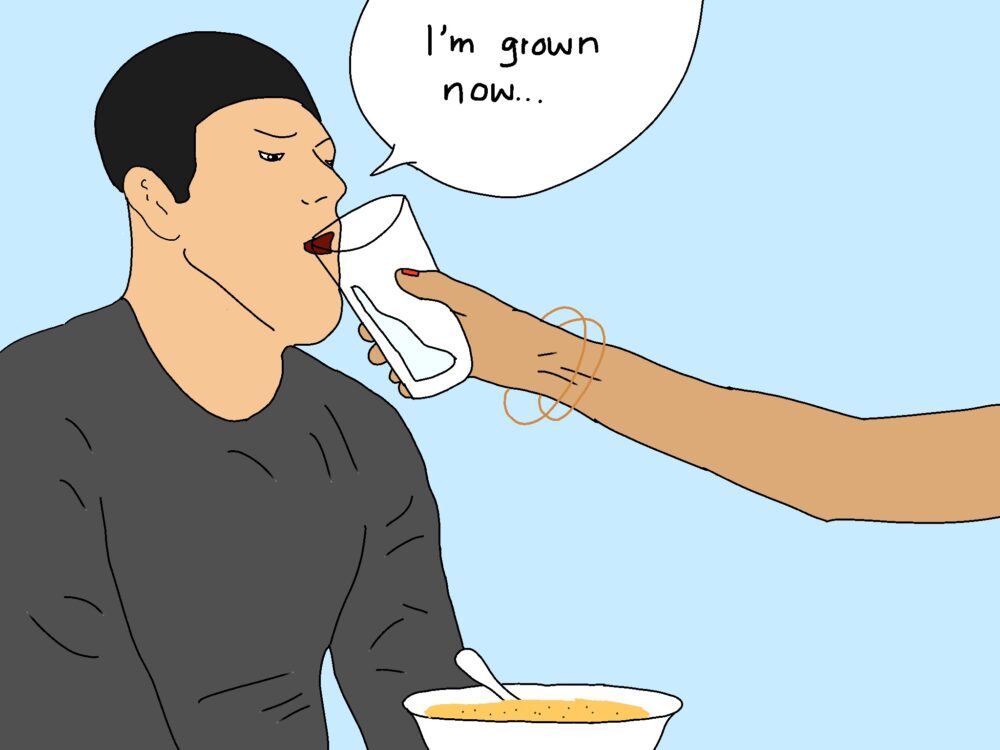
Parenting is something that people can read and listen about, but when the time comes, it’s up to parents how they want to raise their kids. While some argue that kids shouldn’t be coddled, others say that kids aren’t being coddled and are only being encouraged.
Children are coddled too much.
By Kyle Nguyen
Parents coddle their children too much, and although they use the excuse that we’re only children who should be treated as such, coddling will eventually lead to development problems and prevent children from having the chance to grow up.
It’s easy to understand why a parent would want to coddle their child: it’s simply all out of love. We also grow up relying on the adults around us in our early years to teach us different things.
That said, it’s normal for adults to treat us like children because we are, but the problem is that parents don’t know when to stop treating their grown-up teenagers like the children they used to be. An example would be a parent giving their child a gift when they’ve done a good deed. There’s no need to reward children every time they do something good because it may cause pressure on the child to reach high expectations, in hopes of getting some reward. In the process, children may forget to realize that it’s okay to make mistakes and mess up sometimes.
When parents or communities around them raise children with childish treatment all their life, it can shock a child when they don’t receive the same treatment from others as they grow up. Children are still normal people no different from adults, so there’s no need to shield them from how harsh or cruel the world can be. For example, children who are coddled in their youth may be struck by reality when looking for jobs with harsh training methods that contrast the indulgent treatment they received as kids.
When that shock of not being a child anymore suddenly hits, which happens usually in high school, it’s easy for kids to start developing problems and feel as if they never had a chance to grow up. Children who were coddled in their youth will have to deal with mental issues or anxiety due to a sudden change in treatment and environment. Even teachers may have to change their curriculum because parents will want to shield their children from sensitive content which leads to oversensitive children.
These problems become more apparent as they age because these coddled children will probably coddle their own children to the extent they were as well. Parents need to give guidance on how to help their children decide how they want to live their life instead of shielding them. It’s okay to help a kid by giving them advice but in the end, children should be the ones to make a final decision on who they want to become in the future.
The fact of the matter is we’re being treated like young children when we’re far from that. Parents need to accept the reality that their children are growing up. We are teenagers and need to be left to find our own independence and learn from our mistakes rather than be shielded from them.
Children aren’t coddled but encouraged.
By Lylyan Yenson
There isn’t anything wrong with encouraging children. Parents act as their kids’ protectors and encouraging them to do their best shouldn’t be considered a bad thing.
By rewarding children along the way and telling them that they’re doing great, parents can help build their child’s confidence. Making kids aware of their abilities, what they can do and what they’re capable of is what builds self-confidence and self-worth. Compliments have been proven to increase happiness and positivity while boosting their social performance. Praises can also help to motivate kids while doing their chores or working on new achievements.
Little awards such as participation awards can also help kids understand that winning isn’t everything. First and foremost, children should be taught to have fun and put everything into their work because if they can do that they can emerge as the winner regardless. By teaching kids that winning isn’t everything at a young age, they’re able to remember this as they grow up and enjoy life without worrying about the results.
While people argue that continuously encouraging kids can lead to anxiety or mental issues, the difference between coddling kids and encouraging kids is that parents should know when to draw the line. Children shouldn’t be yelled at for every mistake they make, but they shouldn’t forget the difference between right and wrong.
Everyone is different, so naturally, the choices we make are different too, but the parameters we make decisions on are based on what we determine is right. There’s no right or wrong way to raise a child or too little or too much coddling one parent can do. The most important thing is to take into consideration that decisions that are made by parents and adults, in general, can shape what children can do in the future and how they can shape society as a whole.





